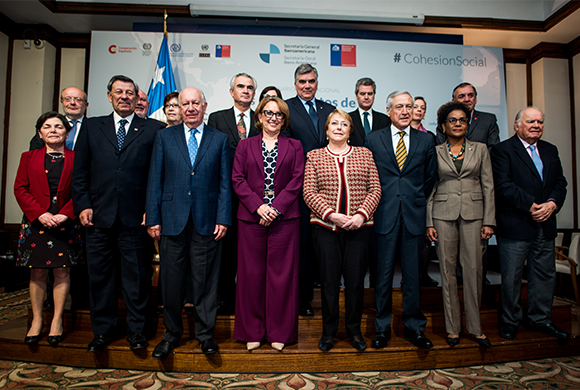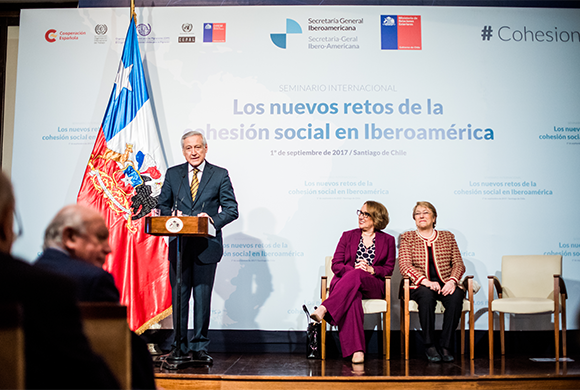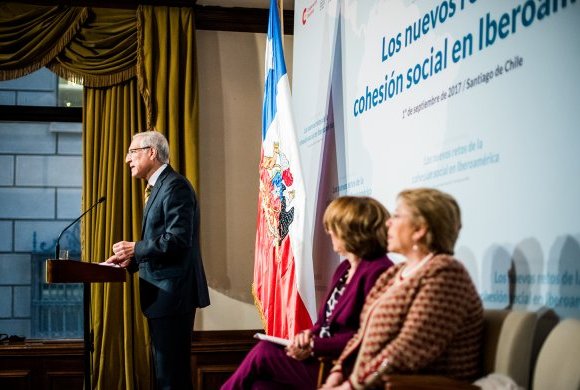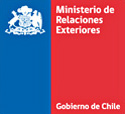
The Minister of Foreign Affairs, Heraldo Muñoz, alongside the President of the Republic, Michelle Bachelet, and the Ibero-American Secretary General, Rebeca Grynspan, inaugurated, this morning, the International Seminar "The New Challenges of Social Cohesion in Ibero-America".
This seminar is a space of reflection and weighing of the achievement and challenges that the Ibero-American countries have face in the past 10 years. At the same time, it focusses on different aspects of a forward looking social cohesion for our region and, particularly, on the 2030 Agenda.
During the opening ceremony, the head of State commemorated that the 2007 summit "revealed a concern shared by the leaders and our people regarding the common socio-political and economic practices, which were reflected in the Santiago Declaration, and it recognized the need to articulate shared economic and social policies within a framework of more democracy and participation". In that moment, he pointed out, "there was a convergence rarely seen in the Ibero-American space, in between consolidated democracies and the economic and social progress. And I believe that it was the foundation to set common goals that, even though ambitious, were achievable".

On his part, the Chancellor highlighted this seminar as an opportunity to reflect and balance everything that has happened in the past decade and it allows us to renew the commitment with sustainable development and social cohesion.
"Chile, as well as all the other countries of the Ibero-American region, is facing big challenges in the short and medium term: Achieve sustainable and inclusive economic growth, reduce inequality in all its forms, tackle climate change and strengthen democratic institutions. Access to quality education and health are essential tools for achieving these goals", noted the Foreign Minister, emphasising the importance of the efforts the region is making to comply with the 2030 Agenda and the 17 Sustainable Development Goals. "The actions taken in the framework of the Ibero-American summits will help us achieve these goals, while complementing our public and external policies", he assured.
He added the Ibero-American cooperation is an example of the accomplishments that can be reached when working together. "After 10 years, we can say that the regional cooperation has become an integrating axis of the Ibero-American space and a supporting instrument for social cohesion and social policies". He also added that "the work within the Ibero-American framework, in South-South Cooperation matters, has been strengthen and intensified since the year 2007, with the publication go the first Ibero-American South-South Cooperation Report".

The Secretary of State also highlighted Chile's efforts in this regard, noting that "never in our history has Chile contributed more to the development of the region than under the government of President Bachelet". In this regard, the efforts directed towards Central America and the Caribbean stand out, as it was reflected in the tour just concluded by the President to Honduras, Barbados and Saint Lucia and in the Chile-SICA Dialogue and Cooperation Forum to be held next October in Chile.
"In short, the work of stimulating Ibero-American cooperation undoubtedly contributes to an integral and inclusive development for the benefit of all, collaborating to contribute to the reduction of asymmetries and inequalities and to the consolidation of more articulated and supportive societies within the framework of the diversity of our people ", he concluded.
The seminar was divided in 3 panels:
"Lessons learned from the Uruguay (2006) and Chile (2007) summits". The panellists were the Chancellor of Uruguay, Rodolfo Nin; the former president of the Republic, Ricardo Lagos; and the first Ibero-American secretary, Enrique Iglesias.
"Integration, interculturality and inclusive identities". The panellists were the Ibero-American Secretary General, Rebeca Grynspan; the Secretary General of the International Organization of the Francophonie, Michaëlle Jean; the Spanish Secretary of State for International Cooperation and for Ibero-America and the Caribbean, Fernando García.
"Current challenges and prospects for social cohesion by 2030". The panellists were the Minister of Social Development of Chile, Marcos Barraza; the Director of the IOM Regional Office for South America, Diego Beltrand; the Minister of Social Development of Uruguay, Marina Arismendi; the ILO Director for Latin America and the Caribbean, José Manuel Salazar; and ECLAC Executive Director, Alicia Bárcena.
